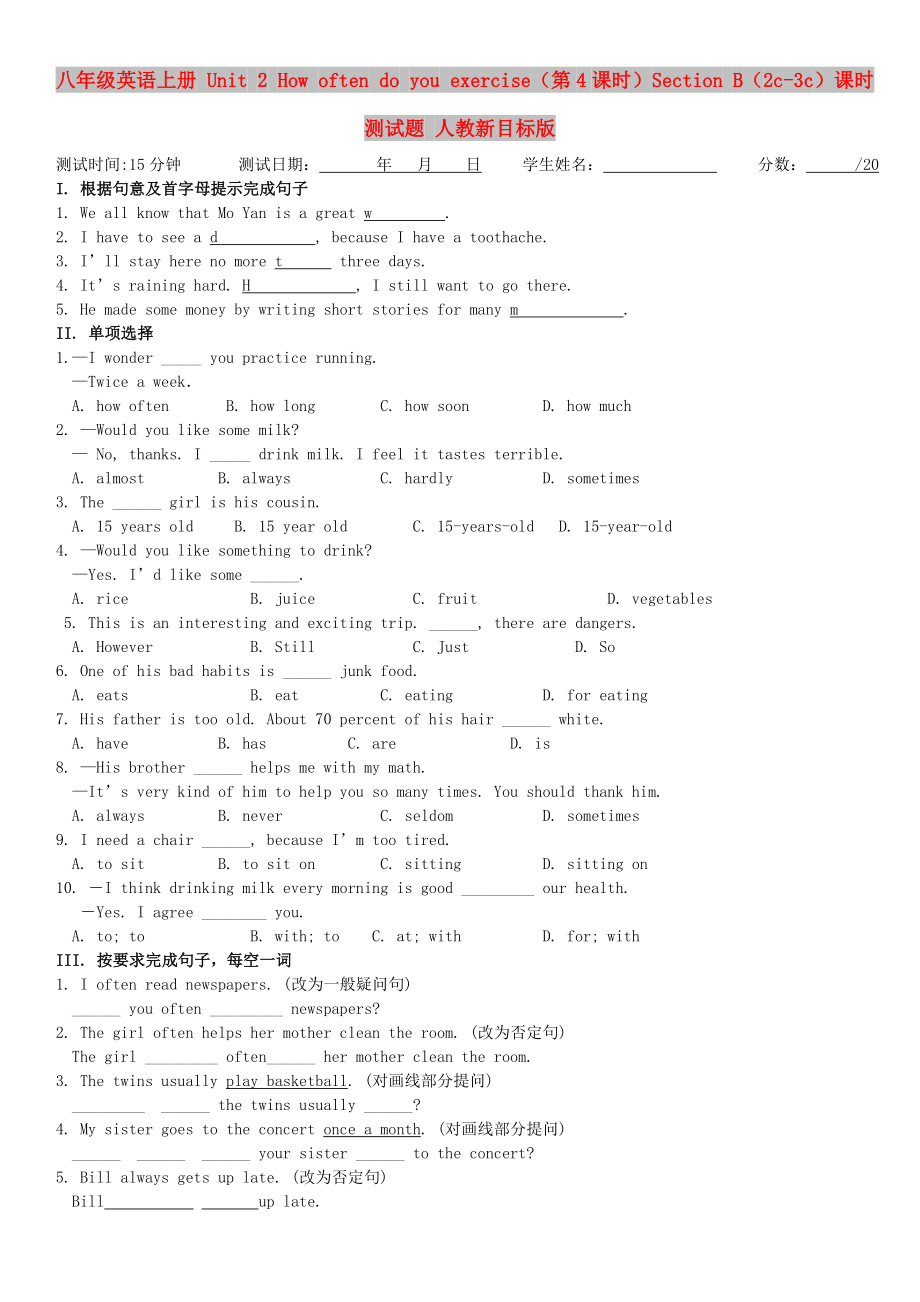《八年級(jí)英語(yǔ)上冊(cè) Unit 2 How often do you exercise(第4課時(shí))Section B(2c-3c)課時(shí)測(cè)試題 人教新目標(biāo)版》由會(huì)員分享�,可在線(xiàn)閱讀,更多相關(guān)《八年級(jí)英語(yǔ)上冊(cè) Unit 2 How often do you exercise(第4課時(shí))Section B(2c-3c)課時(shí)測(cè)試題 人教新目標(biāo)版(2頁(yè)珍藏版)》請(qǐng)?jiān)谘b配圖網(wǎng)上搜索�。
1、八年級(jí)英語(yǔ)上冊(cè) Unit 2 How often do you exercise(第4課時(shí))Section B(2c-3c)課時(shí)測(cè)試題 人教新目標(biāo)版
測(cè)試時(shí)間:15分鐘 測(cè)試日期: 年 月 日 學(xué)生姓名: 分?jǐn)?shù): /20
I. 根據(jù)句意及首字母提示完成句子
1. We all know that Mo Yan is a great w .
2. I have to see a d , because I have a toothache.
3. I’ll
2����、 stay here no more t three days.
4. It’s raining hard. H , I still want to go there.
5. He made some money by writing short stories for many m .
II. 單項(xiàng)選擇
1.—I wonder _____ you practice running.
—Twice a week.
A. how often B. how long C. how soon D. h
3、ow much
2. —Would you like some milk?
— No, thanks. I _____ drink milk. I feel it tastes terrible.
A. almost B. always C. hardly D. sometimes
3. The ______ girl is his cousin.
A. 15 years old B. 15 year old C. 15-years-old D. 15-year-old
4. —Would you like something to dr
4����、ink?
—Yes. I’d like some ______.
A. rice B. juice C. fruit D. vegetables
5. This is an interesting and exciting trip. ______, there are dangers.
A. However B. Still C. Just D. So
6. One of his bad habits is ______ junk food.
A. eats B. eat C. eating D. for eating
5���、7. His father is too old. About 70 percent of his hair ______ white.
A. have B. has C. are D. is
8. —His brother ______ helps me with my math.
—It’s very kind of him to help you so many times. You should thank him.
A. always B. never C. seldom D. sometimes
9. I need a chair
6、______, because I’m too tired.
A. to sit B. to sit on C. sitting D. sitting on
10. ―I think drinking milk every morning is good _________ our health.
―Yes. I agree ________ you.
A. to; to B. with; to C. at; with D. for; with
III. 按要求完成句子��,每空一詞
1. I often read newspapers
7�����、. (改為一般疑問(wèn)句)
______ you often _________ newspapers?
2. The girl often helps her mother clean the room. (改為否定句)
The girl _________ often______ her mother clean the room.
3. The twins usually play basketball. (對(duì)畫(huà)線(xiàn)部分提問(wèn))
_________ ______ the twins usually ______?
4. My sister goes to the concer
8���、t once a month. (對(duì)畫(huà)線(xiàn)部分提問(wèn))
______ ______ ______ your sister ______ to the concert?
5. Bill always gets up late. (改為否定句)
Bill up late.
參考答案
I. 根據(jù)句意及首字母提示完成句子
1. writer 2. dentist 3. than 4. However 5. magazines
II. 單項(xiàng)選擇
1. A twice a week表示頻率��,用how often提問(wèn),所以選A�。
2
9、. C 由回答中的第一句和最后一句可知選C����。
3. D 這里是“數(shù)詞+單數(shù)可數(shù)名詞+形容詞”構(gòu)成的復(fù)合形容詞,所以選D���。
4. B 問(wèn)句中的drink意為“喝”���,選項(xiàng)中只有juice能喝�����,所以選B����。
5. A 前后兩句話(huà)表示轉(zhuǎn)折關(guān)系����,因此用however,所以選A���。
6. C 在be動(dòng)詞后作表語(yǔ)���,用動(dòng)名詞或不定式,所以選C���。
7. D 主語(yǔ)是hair����,為不可數(shù)名詞��,所以選D。
8. A 由答語(yǔ)中的so many times可知選A��。
9. B 這里是動(dòng)詞不定式作后置定語(yǔ)的用法��,并且后應(yīng)接介詞���,因此用to sit on�,所以選B���。
10. D句意:——我認(rèn)為每天早晨喝牛奶對(duì)我們的健康有益���。——是的����,我同意你的觀點(diǎn)�����。
根據(jù)句意第一個(gè)空格處應(yīng)用be good for“對(duì)……有益”�,第二個(gè)空格處應(yīng)用agree with sb.
“同意某人”���,故選D��。
III. 按要求完成句子�����,每空一詞
1. Do; read 2. doesn’t��;help 3. What do; do 4. How often does; go 5. never gets
 八年級(jí)英語(yǔ)上冊(cè) Unit 2 How often do you exercise(第4課時(shí))Section B(2c-3c)課時(shí)測(cè)試題 人教新目標(biāo)版
八年級(jí)英語(yǔ)上冊(cè) Unit 2 How often do you exercise(第4課時(shí))Section B(2c-3c)課時(shí)測(cè)試題 人教新目標(biāo)版

